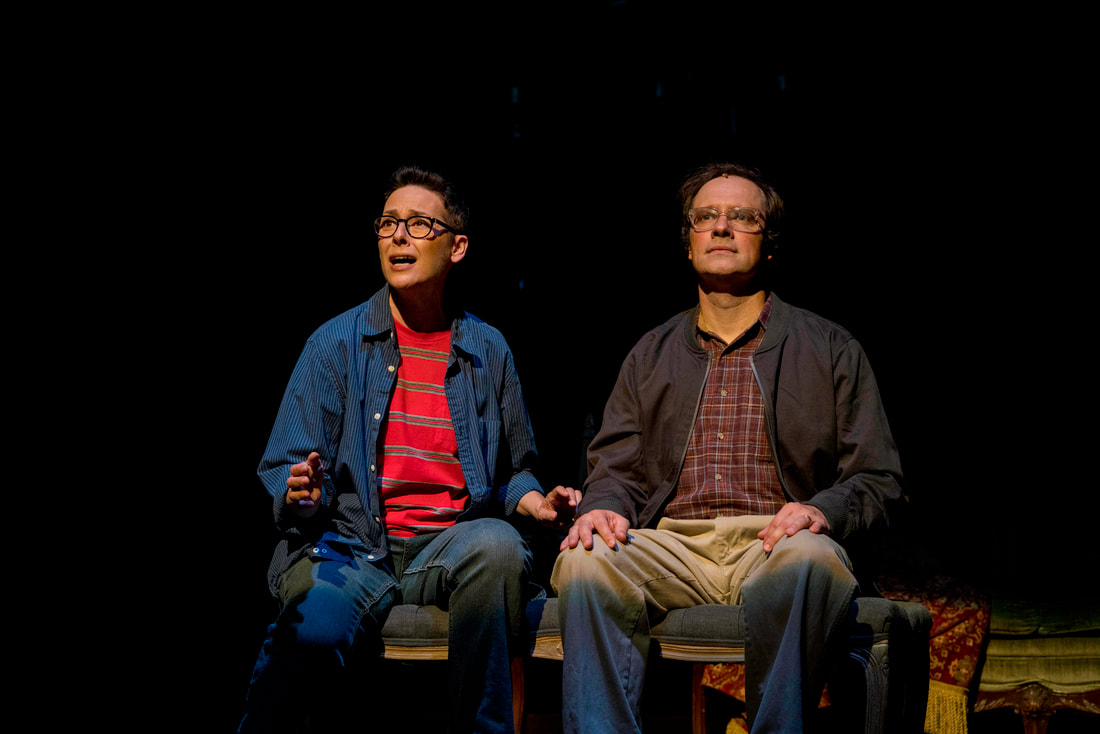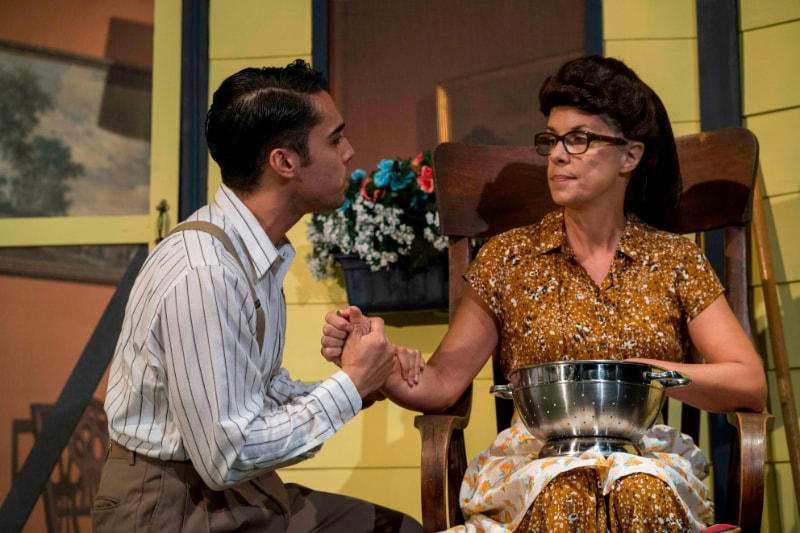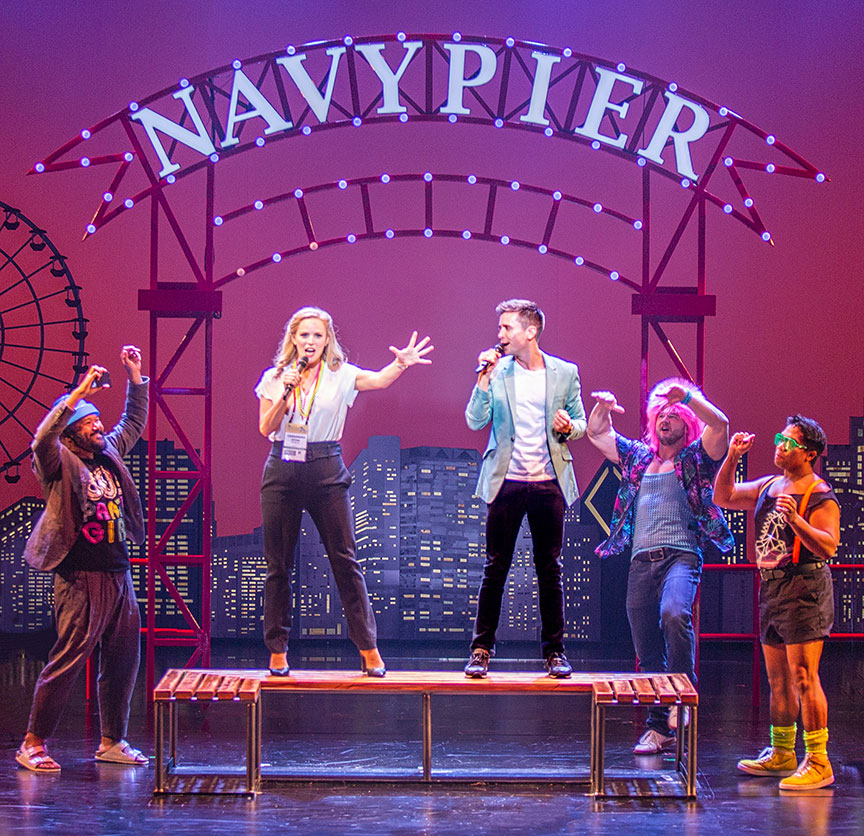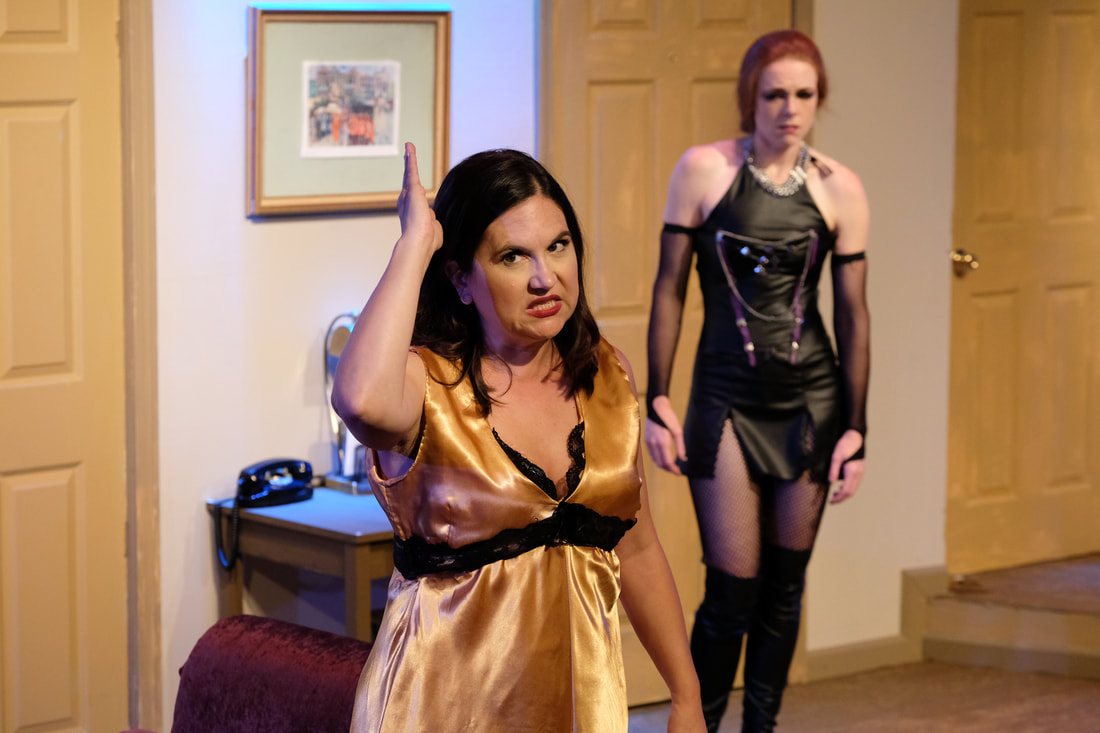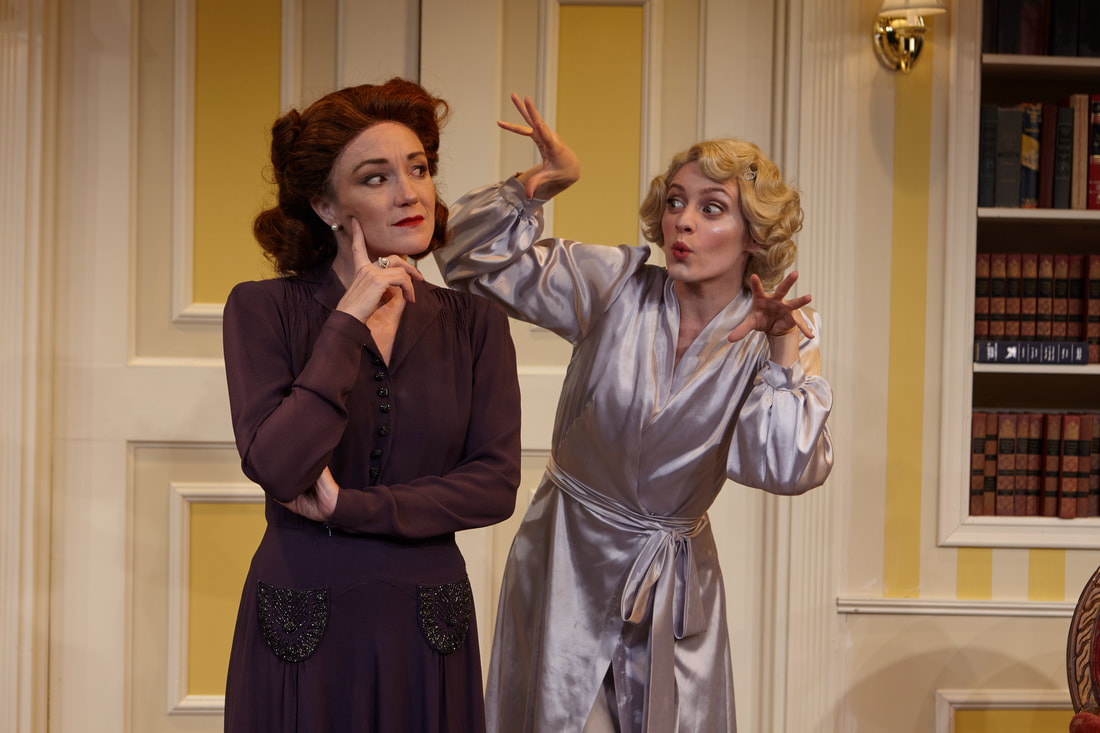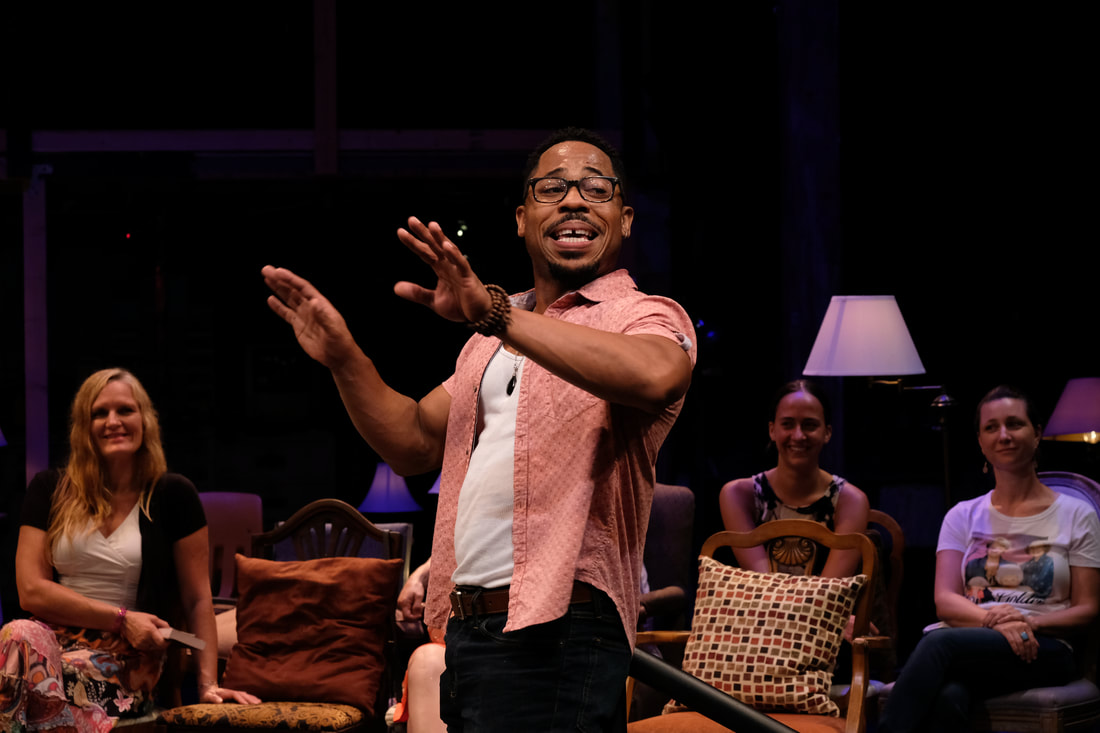|
Alice Birch’s experimental Revolt. She Said. Revolt Again is a fiercely feminist affirmation that in the Diversionary black-box theater that is home to InnerMission Productions inundates the little space with sound and fury. As much performance art as it is theater, the one-act Revolt is divided into half a dozen vignettes, performed with tireless commitment by a cast of six (five women and one man). Bravest of them all is UCSD student Kirstiana Rosas, delivering a desperately forthright monologue as uninhibited as though she were standing in front of a mirror.
The searing hour and a half explores women’s rights to their own bodies and to equal treatment at work, the questions of reproduction and exploitation, and even rape. It turns loud and excessive in the last 10 minutes or so, but its ardency never wanes. (Review originally published in San Diego CityBeat on 9/26/18)
0 Comments
Amanda Naughton and Jim Stanek in "Fun Home." Photo by Daren Scott The “fun home” in Alison Bechdel’s childhood and adolescence is what she and her siblings call their father’s funeral home – his side business when he’s not teaching English. On the surface, there’s a lot of fun going on in the family’s actual home. But then neither young Alison nor her siblings know that their dad is gay and that he’s having relationships outside the home and his marriage. In Fun Home, the acutely thoughtful musical by Jeanine Tesori and Lisa Kron based on Bechdel’s graphic novel, the grown Alison (Amanda Naughton) tells the story not only of her father’s tortured double life but of her own coming to terms with her sexual identity, and her coming out.
Alison is also seen as a child (on opening night played by Taylor Coleman) and a college student (Claire Adams), giving Fun Home a three-pronged, multidimensional narrative, with Naughton as the omnipresent narrator. Aside from Naughton’s steady performance and equally penetrating turns from Jim Stanek as father Bruce and Bets Malone as mother Helen, Fun Home successfully makes a very personal story feel universal. Its score is up and down, and the kids’ dance scenes are little more than distracting, but there’s no missing Fun Home’s declarations on love and truth to oneself. (Review originally published in San Diego CityBeat on 9/26/18.) Aaron Lugo and Allison MacDonald in "All My Sons." Photograph by Daren Scott Having opened its 35th season earlier this year with a rousing production of the parodic musical Xanadu, Chula Vista’s OnStage Playhouse goes in a very different direction with Arthur Miller’s sobering family drama All My Sons. This staging is less memorable than that of Xanadu, but the enduring acuity of Miller’s play ultimately carries the day.
OnStage is presenting All My Sons, directed by James P. Darvas, in significantly remodeled confines, including more comfortable seats (imported, OnStage aristic director Teri Brown confided, all the way from Ohio). The cozy Midwest backyard setting, designed by Jadelin Boldenow, extends white picket fence and all practically to the first row of seats, guaranteeing that anyone in any of the three rows is close to the drama. Drama it is, too, in this play, which evolves proddingly but delivers a gut punch before it is through. The now-on-hiatus Intrepid Theatre Company mounted a tremendous All My Sons four years ago and was rightly honored by the San Diego Theatre Critics Circle for Outstanding Dramatic Production for that calendar year. OnStage’s All My Sons is much more rapidly paced than Intrepid’s, clocking in at less than two hours (though it’s a three-act play), and at times it seems to rush through Miller’s piquant dialogue. While stagings of All My Sons can be overly ponderous, this one should be slowed down just a tad. The story concerns the household of Joe and Kate Keller in the post-wartime late’40s. Kate (beautifully played here by Allison MacDonald) longs for the return of her missing son, Larry, whom she fiercely believes will return to her despite everyone else’s resigned belief that he was killed in the war. Her denial, however, pales beside that of Joe (Mark Solz, stiff in Act One, more aptly explosive later), who harbors a deadly “secret” that almost everyone already knows. Tensions mount as the Kellers’ surviving son, Chris (Aaron Lugo, along with MacDonald the most touching among the cast), brings to town Larry’s former fiancée, Ann (Emily Candia), whom he now intends to wed. The notion of culpability hovers over the entire story, and that of forgiveness is grudging. But even in 2018, this reflects the path that life, including among families, often takes. All My Sons runs through Oct. 13 at OnStage Playhouse in Chula Vista. $20-$25; onstageplayhouse.org Katie Rose Clark and Matt Doyle (with microphonnes) in "The Heart of Rock & Roll." Photo by Jim Cox Among the questions confronting bar-band Bobby, the likable hero of the Huey Lewis and the News-inspired jukebox musical The Heart of Rock & Roll, is: Is it hip to be square? Is it better to be an exec with a cardboard-box company than to be a big-time rocker? The answer would seem a no-brainer, but then Bobby’s got some extenuating circumstance that comprise the storyline of this world-premiere show at the Old Globe Theatre.
The good-timey, decidedly non-anarchic hits of Lewis and the News are a comfortable fit for an aspiring Broadway musical. Not only are the tunes themselves – mostly chestnuts from the ‘80s – bright and sing-able, but thanks to the show’s writers, Jonathan A. Abrams and Tyler Mitchell, they’re also easily integrated into the narrative. Besides “Hip to Be Square,” favorites such as “Workin’ for a Livin,” “Do You Believe in Love,” “If This Is it” and the title song function just as if they were crafted for the stage. But make no mistake: This is not American Idiot. The Heart of Rock & Roll is safe and satisfying, the kind of good time Huey Lewis and the News ensured in concerts and for viewers of their MTV-driven videos. No one in the story itself is really a heavy. Everyone’s got some wholesome good in them, even the superficial wannabe beau (Billy Harrigan Tighe) of lovely Cassie Stone (Katie Rose Clarke), the cardboard-box CEO who Bobby (Matt Doyle) falls for. It’s inevitable that the “Power of Love” will win out. A superb comic turn by Orville Mendoza as eccentric business magnate Harrison Fjord adds considerably to the non-musical portions of the show. All the stage bells and whistles are on display in this Globe production directed by Gordon Greenberg. The versatile set (designed by Derek McLane) shifts impressively from dive bar to product-convention floor to Chicago’s Navy Pier, and more. Lorin Latarro’s choreography is likewise inspired, in one sequence employing bubble wrap as a dance floor. One’s affection for and familiarity with the songs of Huey Lewis and the News may ultimately determine enjoyment of The Heart of Rock & Roll. Then again, there’s a lot to like about a big, splashy show that doesn’t take itself too seriously. (Review originally published 9/19/18 in San Diego CityBeat.) Wendy Waddell (left) and Kate Rose Reynolds in "Communicating Doors." Photo courtesy of Scripps Ranch Theatre Door No. 3 is the one to keep an eye on in Scripps Ranch Theatre’s production of Alan Ayckbourn’s Communicating Doors. Though its very presence in the story is infuriatingly never explained, this door is a portal back and forth in time through which three women travel: a dominatrix (Kate Rose Reynolds) and the wives (Wendy Waddell and Sibongile Ngako) of an unscrupulous businessman (Charles Peters). If this all sounds quite confusing, imagine how the characters feel transporting from one era to another. Confused though they may be, they’re also sharp enough to figure out a couple of murder plots (which, if allowed to play out, would prove fatal to them).
Unfortunately, Communicating Doors doesn’t stop there. Besides being a genuinely creepy suspense tale, it also tries to be a comedy, sometimes of the sheer slapstick variety. In so doing, the play, though gamely performed, never definitively establishes what it wants to be. (Review originally published in San Diego CityBeat on 9/12/18.) Joanna Strapp (left) and Teagan Rose in "Blithe Spirit." Photo courtesy of North Coast Rep Noel Coward was a wordsmith of unparalleled wit and flamboyance. It’s his deliciously cutting language that distinguishes Blithe Spirit, the perpetually produced farcical comedy about a man engaged in “astral bigamy.” Charles Condomine (what a name) is curious about the occult. The hapless spiritualist he engages to satisfy that curiosity with a seance unwittingly resurrects in ghostly form his dead wife, Elvira. This proves most intolerable to Charles’ present wife, Ruth, though he himself comes to fancy the idea of having two wives.
This veddy English trifle (though it’s a two-hour, 40-minute trifle) opens North Coast Repertory Theatre’s 37th season. Theirs is a game cast directed by Rosina Reynolds, with J. Todd Adams quick and sputtering as George, Joanna Strapp simmering and exasperated as Ruth, and Teagan Rose charming as could be as ghostly Elvira. However elegantly written, however, the three-act Blithe Spirit rambles on and on. Its scenes with spiritualist Madame Arcati (Susan Denaker) are excessive, and the Charles vs. Ruth confrontations repetitive. Happily, Coward’s intended spirit of playfulness never recedes. (Review originally published in San Diego CityBeat on 9/12/18.) Ro Boddie stars in "Every Brilliant Thing." Photo by Ken Jacques Nine times out of ten, a theatrical production that leans heavily on audience participation is annoying. Non-actors cannot act. They’re even worse at improvisation. That being said, Cygnet Theatre’s Every Brilliant Thing is not annoying. It’s not brilliant, though Ro Boddie, the endearing and indefatigable star of the 90-minute solo show, comes damned close.
In this play adapted from a short story, “brilliant” does not mean blindingly intelligent. In British parlance, “brilliant” means wonderful, and Every Brilliant Thing was written by Englishman Duncan Macmillan along with Dublin-born comedian Jonny Donahoe. In the hands of Boddie and director Rob Lutfy, Every Brilliant Thing transcends its British roots. It’s a story for the world, effusively told, and bearing the message that life is worth living. For a million reasons. That’s how many “brilliant things” Boddie’s unnamed master of ceremonies lists during the show, everything from “ice cream” to “hugs” to “laughing so hard something comes out your nose.” The impetus for the list is his character’s mother’s attempted suicides, which haunt him from childhood through his 20s and beyond. The novelty of this production is audience recruitment and engagement. Pre-show, Boddie circulates in the Old Town Theatre lobby and chooses participants, who during Every Brilliant Thing are called upon for tasks as minor as shouting out something on the list when prompted, or as conspicuous as portraying, by speaking lines fed to them or spontaneously, people in the narrator’s life. The success of all this depends on each performance’s audience members. In any situation, Boddie is poignant and unflappable, and so tireless that at one point he even runs around the theater giving everyone in the crowd a high-five. It seems like Every Brilliant Thing would work just as well with sound effects and screen projections, thereby avoiding potentially awkward “performances” by patrons, they who undoubtedly enjoy these bits more than do non-participatory theatergoers. Whatever its devices, however, Every Brilliant Thing honestly confronts the incomprehensibility of suicide while affirming the priceless value of living. (Review originally published in San Diego CityBeat on 9/5/18.) |
AuthorDavid L. Coddon is a Southern California theater critic. Archives
July 2024
Categories |
David Coddon |
|
